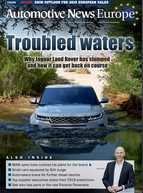DETROIT -- Carlos Ghosn's criminal prosecution in Japan might be creating strain inside the Renault-Nissan-Mitsubishi alliance.
But that situation is not slowing the automakers' plans to bring their vehicle platforms closer together, declared Nissan's head of global planning, Philippe Klein.
"I am going to be damn clear," Klein told Automotive News when asked whether Ghosn's legal trouble is causing a reconsideration of shared platforms: "What is taking place is not changing, is not challenging, is not questioning [the alliance]. There is frankly no willingness to change that."
Klein said the three automakers recently met to hammer out a new level of shared product development activity, which extends to a range of global vehicles.
Of the Nissan vehicles expected to hit the market over the next five years, "all but one will be heavily sharing platforms and components" with alliance partners, said Klein, Nissan's chief planning officer. "We are not changing our product planning process at all."
Weaving together the product development efforts of the alliance had been a passionate mission for Ghosn in recent years. The alliance has announced plans to share global platforms across a large number of vehicle segments.
But on Nov. 19, police in Tokyo arrested Ghosn on charges of complex financial improprieties, and he was quickly removed as chairman of Nissan and Mitsubishi. Ghosn remains in jail in Japan without bond, but is arguing that he has been falsely accused. He remains CEO of Renault with his duties being handled by other senior executives.
Klein declined to discuss Ghosn's situation during an interview at the Detroit auto show, but he reacted strongly to the question that has hovered over the alliance since the arrest: whether Ghosn's departure might cause the three automakers to drift away from their alliance efforts.
"There is a lot of things moving, and it's going to require readjustment," Klein said of the crisis. "But, we are going to manage to go through that."
Disrupting the Renault-Nissan-Mitsubishi tie-up might not be an option.
The alliance now intertwines manufacturing, sourcing and product planning among the three automakers. Ghosn contended that the cooperation is critical to tackling industrywide challenges, such as tightening environmental regulations, powertrain transitions, the development of autonomous driving and the emergence of new transportation models.
The automakers are stitched together in a complex web of cross-shareholdings. Renault has a controlling 43 percent of Nissan. Nissan, the bigger, more profitable partner, owns just 15 percent of Renault and has no voting rights. Nissan also has a controlling, 34 percent stake in Mitsubishi.

